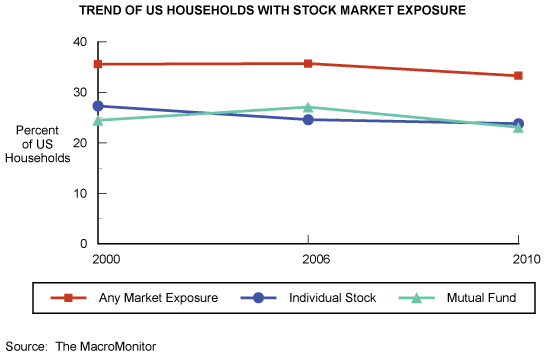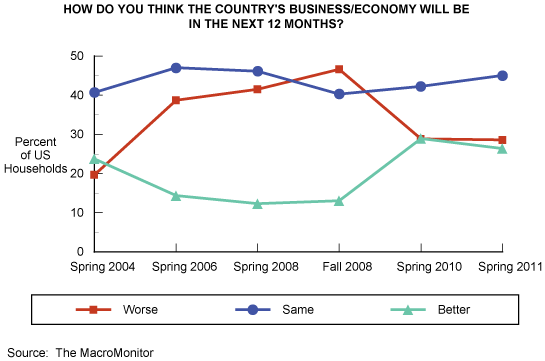MacroMonitor Market Trends September 2011
MacroMonitor Market Trends is a newsletter from Consumer Financial Decisions that highlights topical news and trends of interest to you and your colleagues. If you would like more information about the topic in the newsletter or would like to discuss other ways that we can assist you in your research and marketing efforts, please contact us.
Uh-Oh! Consumer Reaction to Stock Market Uncertainty Is a Drop in Consumer Confidence
Stock market swings in August 2011 captured media attention. Reports of doom and gloom, threats of a double-dip recession, and an impending global financial-meltdown crisis were prominent features. To the casual, uninformed observer, the sky will soon fall. If pundits are to be believed, there is plenty of blame to go around. Although it is institutional investors who ultimately set the price of equities and drive big swings in the stock markets, individual investors are directly affected. But do lower levels of consumer confidence translate into fewer households investing in equities?
The answer is a qualified no. A majority of US households are not directly affected by stock market volatility (they do not own stocks directly or indirectly), whereas about one-third of households currently hold stocks either through ownership of individual stocks or stock mutual funds in their after-tax portfolios or in employer-sponsored retirement plans.

Overall, the proportion of households with stock market exposure has trended down only slightly between years 2000 and 2010; the most notable decline is of households with exposure to equities through mutual funds. In spite of market swings, investors continue to recognize that in the long term, there are few viable alternatives to the stock market for earning sufficient returns to protect savings against the effects of inflation. To be sure, money is taken out of stocks and put into other assets during periods of market volatility, but the body of US households with some exposure to equities remains relatively stable.
Consumer confidence, on the other hand, includes the perceptions of the other two-thirds of consumers—those who have no personal exposure to equities. Sharp declines in the stock market can signal potential layoffs, and the possibility of more jobs lost as a result of bad economic news is more disturbing to more households (roughly 66%) than is news of investor losses (33%). Potential job loss is the most likely reason that there is a decline in consumer confidence immediately following negative economic reports. An eight-year trend in consumer-confidence data from GfK MRI's Survey of the American Consumer demonstrates the magnitude of the immediate decline in confidence following the market's precipitous drop in fall 2008. Respondents are asked how they think US business and the economy will be in the coming 12 months. In fall 2008, almost half (47%) reported that the economy will be worse off—40% reported they anticipate the economy will remain about the same. In spring 2011's marginally improved economic environment, the result of the mid-August market tumble is a reported 30-year low in consumer confidence.

How do financial-service providers plan a business strategy when business volume is uncertain?
- Now is the time to innovate!
- Keep your finger on consumers' pulse
- Be aggressive in efforts to create consumer demand.
For more information, contact CFD.